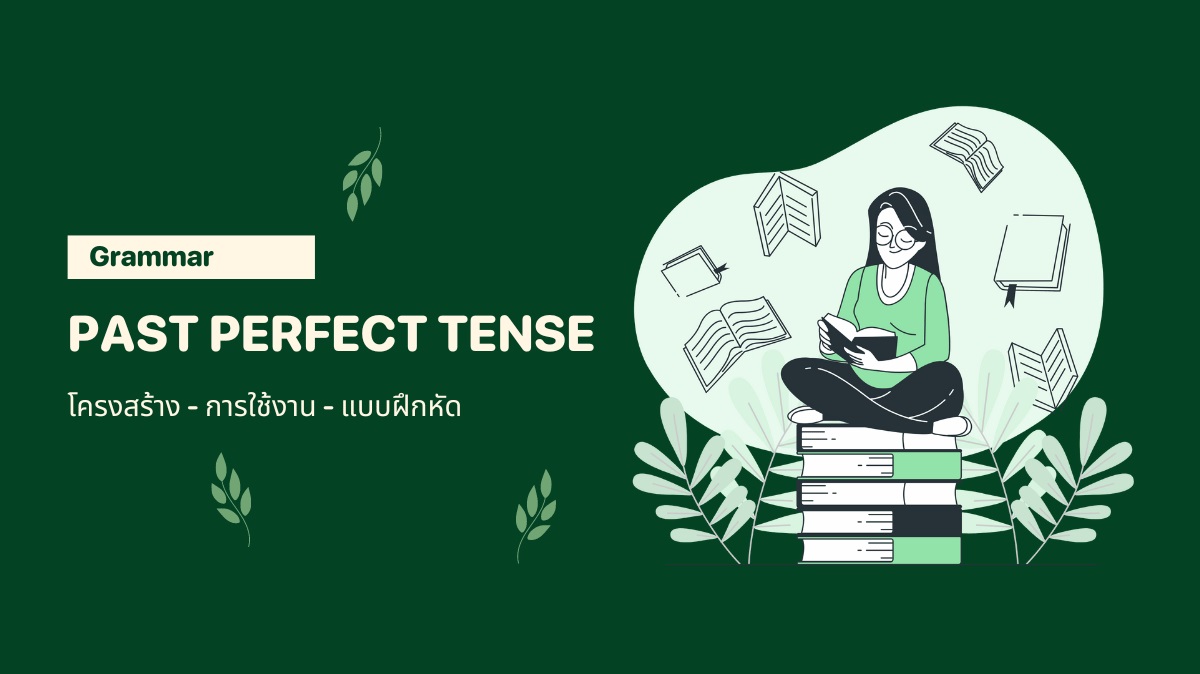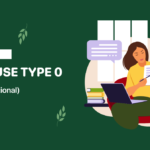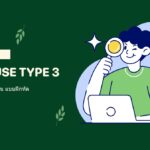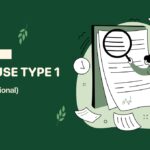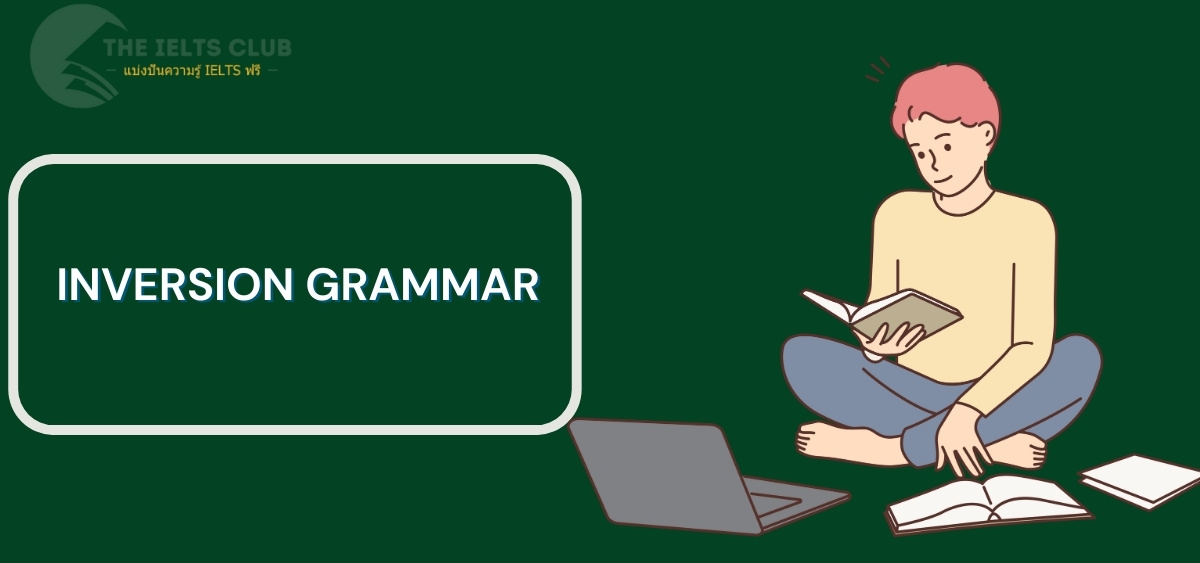เคยไหมครับ? งงกับประโยคภาษาอังกฤษที่พูดถึงเหตุการณ์ในอดีตสองเหตุการณ์ เกิดขึ้นก่อนหลังกันอย่างไร? วันนี้เรามีตัวช่วยที่จะปลดล็อกความลับของ “รูปแบบอดีตสมบูรณ์แบบ (Past Perfect tense)” มาไขข้อสงสัย เรียนรู้วิธีใช้ ฝึกฝนทักษะ ผ่านบทความสุดละเอียด พร้อมตัวอย่างประโยคมากมาย เตรียมพร้อมสื่อสารภาษาอังกฤษได้อย่างมั่นใจ!
I. Past Perfect Tense คืออะไร?
Past Perfect Tense ใช้เพื่อแสดงการกระทำที่เกิดขึ้นก่อนและเสร็จสมบูรณ์โดยสมบูรณ์ก่อนจุดเวลาเฉพาะในอดีต จุดเวลานี้อาจแสดงด้วยเวลาเฉพาะ (เช่น 8 โมงเช้า), การกระทำอื่น ๆ ในอดีต (เช่น หลังจากที่ทานอาหารเสร็จ), หรือ อธิบายด้วยประโยคแสดงเวลา (เช่น ก่อนที่จะมืด)
ตัวอย่าง:
- I had finished my homework before you arrived. (ฉันทำการบ้านเสร็จก่อนที่เธอจะมาถึง)
- She had been studying for hours when she fell asleep. (เธออ่านหนังสือมาหลายชั่วโมงแล้วตอนที่เธอหลับไป)
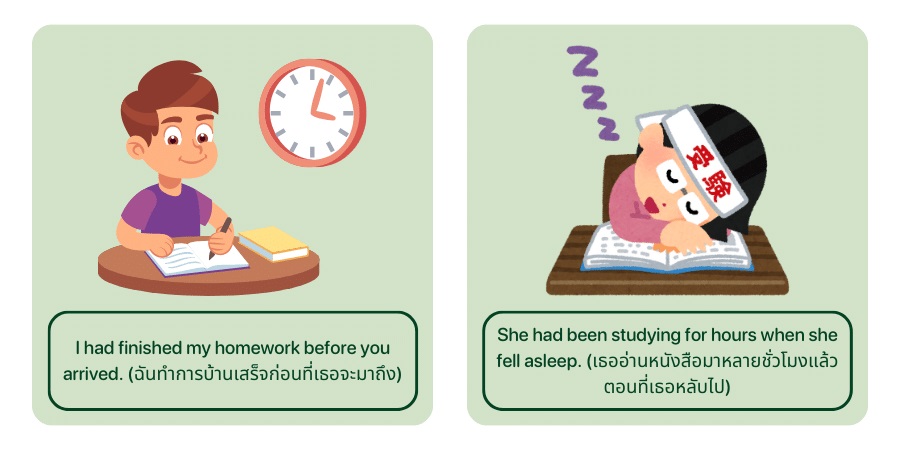
II. สูตรในการใช้งานอดีตสมบูรณ์แบบ
- รูปบวก
S + had + V3/ed
ตัวอย่าง: You had prepared dinner before they arrived. (คุณเตรียมอาหารเย็นก่อนที่พวกเขาจะมาถึง)
- รูปปฏิเสธ
S + had + not + V3/ed
ตัวอย่าง: He had not completed his assignment. (เขายังทำงานมอบหมายไม่เสร็จ)
- คำถามแบบ Yes/No
Had + S + V3/ed?
ตอบ:
- Yes, S + had
- No, S + had + not
ตัวอย่าง: Had they finished the project? (พวกเขาทำโครงการเสร็จหรือยัง?)
No, they had not. (ไม่พวกเขาไม่ได้)
- คำถามแบบ WH
When/Where/Why/What/How + had + S + V3 + O?
ตัวอย่าง:
- Where had you traveled before moving here? (คุณเคยไปเที่ยวที่ไหนก่อนที่จะย้ายมาที่นี่?)
- Why had she left the job before finding a new one? (ทำไมเธอจึงออกจากงานก่อนที่จะหางานใหม่?)
III. การใช้ Past Perfect Tense
เพื่อให้เข้าใจการใช้ Past Perfect Tense อย่างถูกต้อง คุณจำเป็นต้องใส่ใจในข้อกำหนดด้านไวยากรณ์ในสถานการณ์ต่อไปนี้:
- แสดงการกระทำสองอย่างที่เกิดขึ้นพร้อมกันในอดีต โดยใช้ Past Perfect Tense สำหรับการกระทำที่เกิดขึ้นก่อน
ตัวอย่าง: She had already left when I arrived. (เธอจากไปแล้วเมื่อฉันมาถึง)
- แสดงการกระทำที่เกิดขึ้นจนถึงจุดหนึ่งหรือการกระทำอื่นในอดีต
ตัวอย่าง: He had finished his homework before he went out. (เขาทำการบ้านเสร็จก่อนที่จะออกไปข้างนอก)
- แสดงการกระทำที่เกิดขึ้นก่อนจุดเวลาหนึ่งๆ ในอดีต
ตัวอย่าง: By the time the police arrived, the thief had escaped. (เมื่อตำรวจมาถึง โจรก็หลบหนีไปแล้ว)
- แสดงการกระทำที่เป็นเงื่อนไขหลักที่นำไปสู่การกระทำอื่น
ตัวอย่าง: If he hadn’t lied to me, I wouldn’t have been upset. (ถ้าเขาไม่โกหกฉัน ฉันคงไม่เสียใจ)
- แสดงเงื่อนไขที่ไม่เป็นจริงในอดีต (Conditional type 3)
ตัวอย่าง: If she had studied harder, she might have passed the exam. (ถ้าเธอเรียนหนักขึ้นเธออาจจะสอบผ่าน)
- แสดงความผิดหวังต่อเหตุการณ์ใดเหตุการณ์หนึ่งในอดีต (บ่อยครั้งที่พบในประโยค Wish)
ตัวอย่าง: I wish I had known about the meeting. (ฉันหวังว่าฉันจะรู้เกี่ยวกับการประชุม)
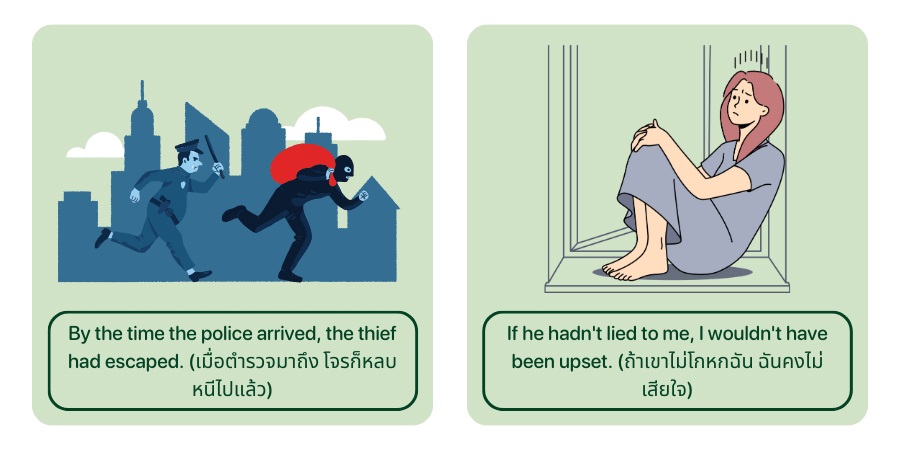
IV. การรู้จำท่านแบบ Past Perfect Tense
ท่านแบบ Past Perfect มักจะใช้คู่กับคำบุพบทและคำเชื่อมต่างๆ เช่น:
- Until then, prior to that time, as soon as, by, …
- Before, after, when, by the time + S + V; by the end of + time in the past …
ตัวอย่าง:
- By the time I met you, I had been working at that company for five years. (ตอนที่ฉันพบคุณ, ฉันได้ทำงานที่บริษัทนั้นมาแล้วห้าปี)
- When I arrived, they had finished the meal. (ตอนที่ฉันมาถึง, พวกเขาได้รับประทานอาหารเสร็จแล้ว)
V. การแยกความแตกต่างระหว่าง Past Perfect vs Past Perfect Continuous
- Past Perfect Tense: ใช้แสดงการกระทำที่เกิดขึ้นและเสร็จสิ้นก่อนเหตุการณ์หรือการกระทำอื่นในอดีต.
- Past Perfect Continuous: ใช้แสดงการกระทำที่กำลังเกิดขึ้นและต่อเนื่องจนถึงเหตุการณ์หรือการกระทำอื่นในอดีต.
ตัวอย่าง:
- Past Perfect: I had been waiting for two hours when I decided to leave. (ผมรอมาแล้วสองชั่วโมงเมื่อผมตัดสินใจออกไป.)
- Past Perfect Continuous: I had been studying for two hours when the alarm went off. (ผมได้ศึกษามาแล้วสองชั่วโมงเมื่อนาฬิกาปลุกดังขึ้น.)
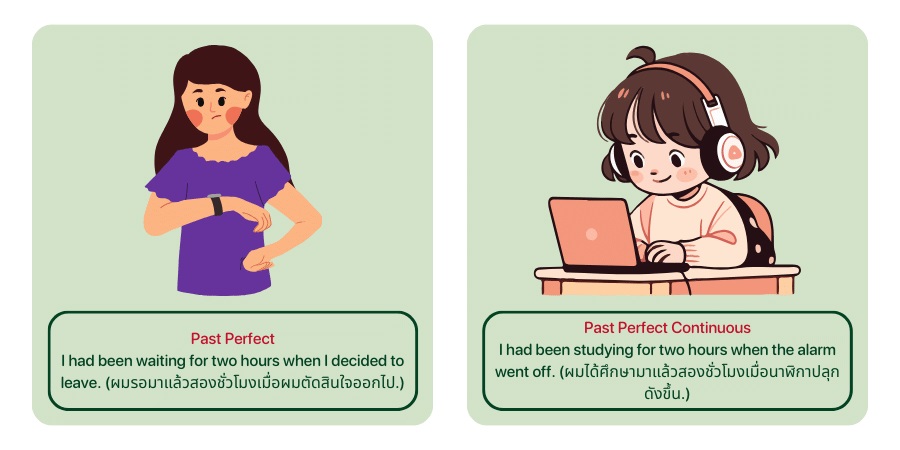
VI. ตัวอย่างประโยค past perfect tense 20 ประโยค
ด้านล่างนี้คือตัวอย่างประโยค 20 ประโยคเกี่ยวกับ Past Perfect Tense ที่คุณสามารถอ้างอิงได้
- I had already eaten dinner when she called. (ฉันกินข้าวเย็นเสร็จแล้วตอนที่เธอโทรมา) – เน้นว่าการกินข้าวเย็นเสร็จสิ้นก่อนที่เธอจะโทรมา
- The movie had started by the time we got to the cinema. (หนังเริ่มฉายแล้วตอนที่เราไปถึงโรงหนัง) – เน้นว่าหนังเริ่มฉายก่อนที่เราจะไปถึง
- She had been studying for hours when she fell asleep. (เธออ่านหนังสือมาหลายชั่วโมงแล้วตอนที่เธอหลับไป) – เน้นว่าเธออ่านหนังสือมาหลายชั่วโมงก่อนที่เธอจะหลับไป
- I had never seen such a beautiful view before. (ฉันไม่เคยเห็นวิวที่สวยขนาดนี้มาก่อน) – เน้นว่าไม่เคยเห็นวิวที่สวยขนาดนี้มาก่อนหน้านี้
- By the time I realized my mistake, it was too late. (เมื่อฉันรู้ตัวว่าผิดพลาด ก็สายเกินไปแล้ว) – เน้นว่ารู้ตัวว่าผิดพลาดเมื่อสายเกินไปแล้ว
- We had already left for the airport when I remembered my passport. (เราออกเดินทางไปสนามบินแล้วตอนที่ฉันนึกขึ้นได้ว่าลืมพาสปอร์ต) – เน้นว่าออกเดินทางไปสนามบินแล้วตอนที่นึกขึ้นได้ว่าลืมพาสปอร์ต
- She had always wanted to visit Paris. (เธอใฝ่ฝันอยากไปเยือนปารีสเสมอมา) – เน้นว่าใฝ่ฝันอยากไปเยือนปารีสมาตลอด
- I had finished reading the book before you even started. (ฉันอ่านหนังสือจบแล้วก่อนที่คุณจะเริ่มอ่านเสียอีก) – เน้นว่าอ่านหนังสือจบแล้วก่อนที่คุณจะเริ่มอ่าน
- They had been arguing for hours when I finally intervened. (พวกเขาเถียงกันมาหลายชั่วโมงแล้วตอนที่ฉันเข้าไปแทรกแซง) – เน้นว่าพวกเขาเถียงกันมาหลายชั่วโมงแล้วก่อนที่ฉันจะเข้าไปแทรกแซง
- I had lost my phone, so I couldn’t call you. (ฉันทำมือถือหาย เลยโทรหาคุณไม่ได้) – เน้นว่าทำมือถือหายก่อน เลยโทรหาไม่ได้
- The train had already left when we arrived at the station. (รถไฟออกไปแล้วตอนที่เราไปถึงสถานี)
- I had just finished taking a shower when the doorbell rang. (ฉันเพิ่งอาบน้ำเสร็จตอนที่กริ่งดัง)
- She had been waiting for me for 15 minutes when I finally showed up. (เธอรอฉันอยู่ 15 นาทีแล้วตอนที่ฉันโผล่หน้า)
- We had driven for hours before we found a gas station. (เราขับรถมาหลายชั่วโมงแล้วก่อนที่จะเจอปั๊มน้ำมัน)
- I had already eaten lunch when you offered me some food. (ฉันทานข้าวกลางวันแล้วตอนที่คุณเสนออาหารให้)
- The meeting had started by the time I got to the office. (ประชุมเริ่มแล้วตอนที่ฉันไปถึงออฟฟิศ)
- She had been working on the project for months when she finally completed it. (เธอทำงานในโครงการนี้มาหลายเดือนแล้วตอนที่เธอทำเสร็จ)
- I had never been to New York City before I moved there. (ฉันไม่เคยไปนิวยอร์กซิตี้มาก่อนที่จะย้ายไปอยู่ที่นั่น)
- By the time I realized I was lost, it was already dark. (เมื่อฉันรู้ตัวว่าหลงทาง ฟ้าก็มืดสนิทแล้ว)
- We had already made plans for the weekend when you invited us to your party. (เราวางแผนไว้สำหรับสุดสัปดาห์แล้วตอนที่คุณชวนไปปาร์ตี้ของคุณ)
VII. แบบฝึกหัดการใช้ Past Perfect Tense
แบบฝึกหัดที่ 1: ใส่คำกริยาในวงเล็บลงในอดีตกาลที่สมบูรณ์แบบ
- By the time I (arrive) at the party, everyone (leave).
- She (not finish) her homework when I (see) her last night.
- They (already eat) dinner when I (get) home.
- I (study) for two hours before I (take) the exam.
- He (know) her for five years before they (get married).
แบบฝึกหัดที่ 2: เขียนประโยคที่สมบูรณ์โดยใช้ Past Perfect Tense โดยยึดตามคำที่แนะนำต่อไปนี้
- before / go / to bed / read / a book
- when / we / arrive / the store / it / already / close
- by the time / she / finish / her work / it / be / too late / go / out
- after / I / study / for an hour / I / feel / tired
- because / he / not eat / breakfast / he / be / hungry / lunch time
แบบฝึกหัดที่ 3: แก้ไขข้อผิดพลาดในประโยคต่อไปนี้
- I had already eaten dinner when my friend arrived.
- She had not finished her homework when I called her.
- Had the train left before you arrived at the station?
- By the time I got home, my sister had already cooked dinner.
- I had studied for two hours before I took the exam.
คำตอบ:
แบบฝึกหัดที่ 1: ใส่คำกริยาในวงเล็บลงในอดีตกาลที่สมบูรณ์แบบ
- By the time I had arrived at the party, everyone had left.
- She had not finished her homework when I saw her last night.
- They had already eaten dinner when I got home.
- I had studied for two hours before I took the exam.
- He had known her for five years before they got married.
แบบฝึกหัดที่ 2: เขียนประโยคที่สมบูรณ์โดยใช้ Past Perfect Tense โดยยึดตามคำที่แนะนำต่อไปนี้
- Before I went to bed, I had read a book.
- When we arrived at the store, it had already closed.
- By the time she finished her work, it was too late to go out.
- After I had studied for an hour, I felt tired.
- Because he had not eaten breakfast, he was hungry by lunchtime.
แบบฝึกหัดที่ 3: แก้ไขข้อผิดพลาดในประโยคต่อไปนี้
- Correct: I had already eaten dinner when my friend arrived.
- Correct: She had not finished her homework when I called her.
- Correct: Had the train left before you arrived at the station?
- Correct: By the time I got home, my sister had already cooked dinner.
- Correct: I had studied for two hours before I took the exam.
Past Perfect Tense เป็นรูปแบบเวลาที่สำคัญในภาษาอังกฤษ ช่วยให้คุณสามารถแสดงการกระทำที่เกิดขึ้นในอดีตได้อย่างชัดเจนและแม่นยำ หวังว่าบทความนี้จะให้ความรู้ที่ครบถ้วนเกี่ยวกับท่านนี้ จงฝึกฝนต่อไปเพื่อใช้ Past Perfect Tense ได้อย่างคล่องแคล่วนะครับ!


